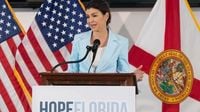In a heated press conference on April 22, 2025, Florida Governor Ron DeSantis criticized the House of Representatives for its proposed budget allocation of $279 million for Everglades restoration, claiming his own plan called for a much larger investment of $800 million. Speaking at the Rookery Bay National Estuarine Research Reserve in Naples, DeSantis accused House leadership of opposing his proposals out of spite, asserting that their actions were politically motivated. "A lot of the reason they’re doing it is because the leadership in the House of Representatives has taken a position that if I’m for something, that it’s their view to just oppose us, just in a knee-jerk fashion," he stated.
Despite the ongoing conflict with the House, DeSantis expressed gratitude towards Senate President Ben Albritton, stating that the Senate's budget "basically agreed" with his $800 million proposal. However, the Senate's budget only allocated $625 million for Everglades restoration, highlighting the discrepancies in funding priorities between the legislative chambers. This budget battle is part of a larger narrative where DeSantis has publicly criticized the House on various issues, including rising condominium fees and funding for the Florida Highway Patrol.
House Speaker Daniel Perez responded to DeSantis's remarks, accusing him of throwing "temper tantrums" and misrepresenting facts during his press conferences. "He gets in front of a camera, and he starts to do one of two things: Either … willingly choosing to lie about what he is telling the people in front of a camera, or he is choosing to not read the bills or look at our budget," Perez remarked. This exchange underscores the growing tensions between the governor and the legislative body, as both sides appear entrenched in their positions.
In a separate but related controversy, it was revealed that DeSantis’s administration diverted $10 million from Medicaid funds to the Hope Florida Foundation, a state-created charity overseen by First Lady Casey DeSantis. This diversion stemmed from a settlement with Centene, Florida’s largest Medicaid contractor, which had overbilled taxpayers by $67 million for medications. Instead of returning the entire amount, the state allocated $10 million to the Hope Florida Foundation, which then funneled money to nonprofit organizations that do not have to disclose their spending.
DeSantis has claimed that this $10 million was a charitable contribution from Centene, separate from what the state was owed. "This is kind of like a cherry on top, where they agreed to make an additional contribution," he said, attempting to clarify the nature of the funds. However, this assertion has been contradicted by documents indicating that the $10 million was part of the settlement agreement and owed to state and federal taxpayers.
As details surrounding the settlement emerged, questions arose about the legitimacy of the Hope Florida initiative, which aims to help Floridians transition off government services. Critics argue that the initiative is essentially a repackaging of existing government programs, lacking transparency and tangible success. State Representative Alex Andrade, who has been vocal in questioning the funding and operations of Hope Florida, stated, "Hope Florida has not provided us any actual tangible track record of success other than a hotline that redirects people back to the state agencies that provide the services."
Furthermore, the entanglement of Hope Florida with political fundraising raised eyebrows. After the $10 million was allocated to the foundation, it reportedly directed two grants of $5 million each to dark money groups linked to the Florida Chamber of Commerce. Shortly thereafter, approximately $8.5 million was transferred to a political action committee controlled by DeSantis’s chief of staff, James Uthmeier, who was later appointed Florida Attorney General.
This political action committee subsequently funneled over $10 million to the Florida GOP for advertising against a recreational marijuana amendment during the last election cycle, as well as $1 million to DeSantis’s own political action committee. Such financial maneuvers have led to allegations of impropriety and raised questions about the ethical implications of using public funds for political gain.
The Hope Florida initiative, which Casey DeSantis has championed as a means to aid low-income residents, has faced criticism for replicating existing services instead of providing new solutions. Florida was one of ten states that declined to expand Medicaid insurance under the Affordable Care Act, leaving nearly 300,000 residents uninsured. Additionally, the state has refused to participate in the Sun Bucks federal program, which provided grocery assistance during the summer months for low-income children.
As the controversy surrounding Hope Florida unfolds, Casey DeSantis's aspirations for political office may be impacted. The initiative, originally intended to bolster her public image and support her husband’s political legacy, is now under scrutiny for its financial management and effectiveness. Critics argue that the program does not adequately address the systemic issues of poverty in Florida, where approximately 3 million residents live in poverty.
In light of these revelations, questions linger about the future of the Hope Florida initiative and its role in the DeSantis administration. As the governor continues to clash with the House over budgetary priorities and funding for environmental restoration, the implications of the Hope Florida scandal could further complicate his political landscape and that of his family’s ambitions.
In summary, the ongoing disputes over Everglades restoration funding and the Hope Florida initiative illustrate the complexities and challenges faced by the DeSantis administration. With tensions rising between the governor and legislative leaders, and growing concerns about the ethical implications of financial decisions, the path forward remains uncertain for both the governor and his family’s political aspirations.





